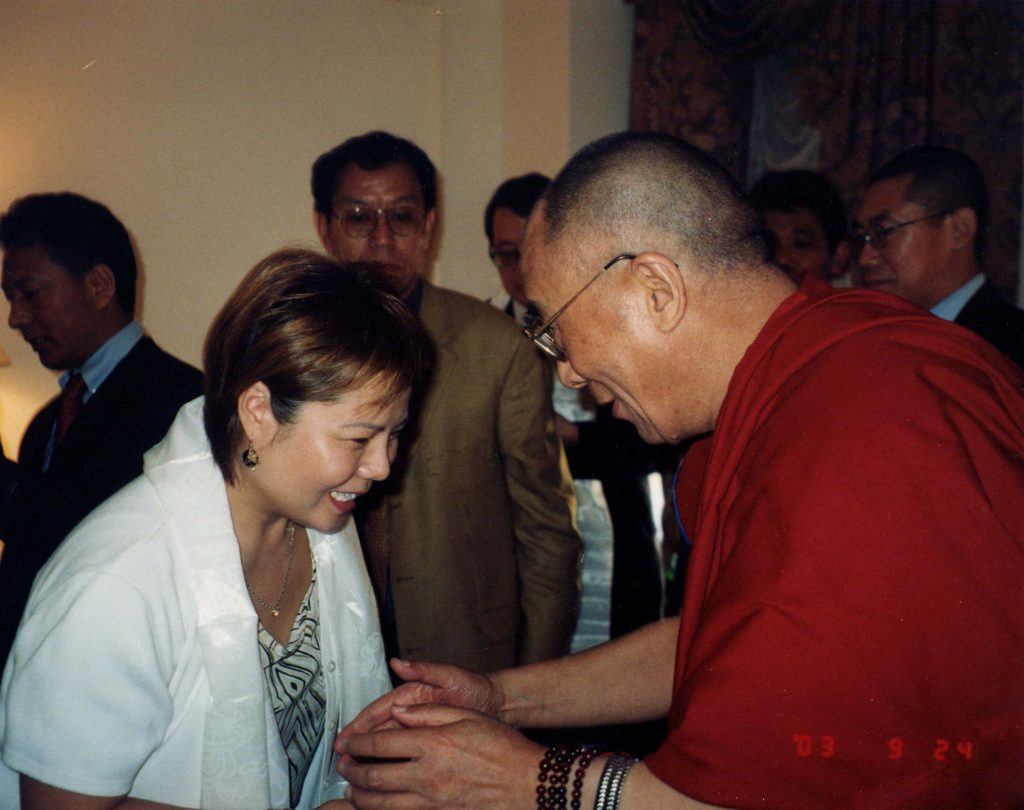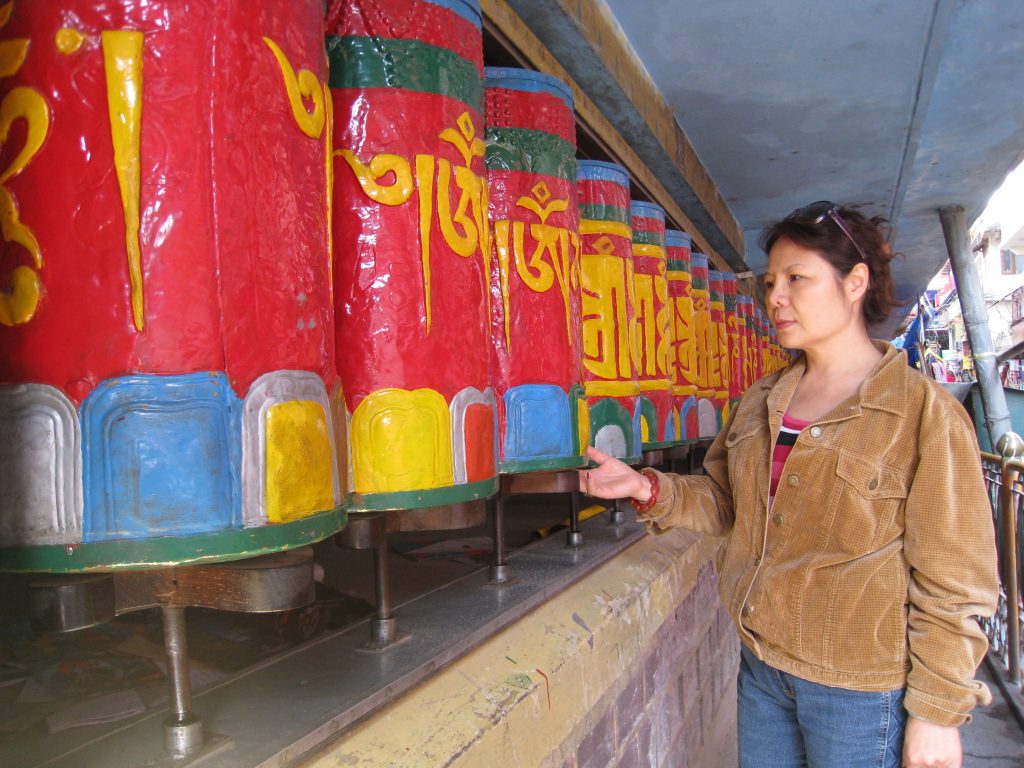His Holiness Teaching “Transcend Suffering”: My Exile Life is Full of Joy
By Jing Zhang of WRIC 07-05-2025
In the blink of an eye, His Holiness the Dalai Lama is nearly 90 years old. It has been almost 20 years since I first had the good fortune to meet His Holiness, and he looks not much different from how he appears in TV news today. The two khatas His Holiness bestowed upon me, imbued with love, philosophy, and strength, I cherish permanently and have benefited from them throughout my life.

Jing Zhang was fortunate to be blessed by His Holiness the Dalai Lama in 2003.
In 1981, I first saw the name of His Holiness the Dalai Lama in a news report in a Macau newspaper. I vaguely remember it was about discussions between Chinese Communist Party (CCP) leaders and the Dalai Lama’s government-in-exile regarding the Tibet issue. At that time, all my understanding of Tibet and Tibetans was what the CCP had instilled: Tibet has been part of China since ancient times, and lamas are “parasites.” I secretly asked myself, if that were the case, why would senior CCP leaders like Hu Jintao go to great lengths to visit Tibetan areas and engage in talks with the “Dalai clique” abroad? Later, I learned that historical facts show Tibet has never been part of China since ancient times; the reason for “negotiations” was that seizing someone else’s homeland was illegitimate; the essence of “negotiations” was like a robber refusing to release hostages while demanding more ransom.
Later, the CCP propagated that “the country has reformed and opened up, welcoming all Hong Kong and Macau compatriots to return home to visit relatives and friends, with bygones being bygones.” I naively believed them and returned to China from Macau, a Portuguese colony, only to be sentenced to five years in prison for “counter-revolutionary propaganda and incitement.” After serving my sentence, I managed to go to Hong Kong and received asylum from the British Hong Kong government. During my stay in Hong Kong, I learned more about His Holiness the Dalai Lama. It turned out that His Holiness is not only the spiritual leader of Tibetan Buddhism, a Nobel Peace Prize laureate, and a world-class iconic figure, but also a sensitive and forbidden word for the CCP, a world-class important figure who must be censored and silenced.
In 1997, after Hong Kong’s sovereignty was handed over to China, I continued my exile, arriving in New York, becoming a true refugee. This allowed me to meet His Holiness the Dalai Lama multiple times. At that time, His Holiness was an elder exile, having been away from his homeland for nearly 50 years. We came from different generations, different ethnicities, different cultural and religious backgrounds, but we were all exiles who had left our homes due to persecution by the CCP. His Holiness’s openness, optimism, and humility deeply moved me, becoming one of the important driving forces that inspired me to overcome homesickness and uphold my conscience throughout the decades of my exile.
I once felt lost and frustrated by my exile life, and also depressed, even somewhat melancholic, due to my long-term focus on the suffering of rural Chinese women subjected to forced abortions. Once, my good friend Li Jianglin (author of 1959 Lhasa) told me that the Dalai Lama said, to “break free from the abyss of past suffering, one must first transform the inner self—weakening destructive emotions and strengthening good human nature.” Only then can one maintain infectious compassion and joy.
She said, you should listen to the Dalai Lama’s dialogues with psychologists and scientists. His Holiness told people that if you want to help others escape suffering, your emotions cannot follow their suffering and become trapped in it. You must transcend suffering and become an observer to rationally offer help and effectively assist more people. These words benefited me greatly. Soon after, I managed to detach myself from the plight and indignant emotions of women deeply suffering from China’s forced abortion policy. I repeatedly encouraged myself, remembering “only by transcending suffering can one effectively help others,” and ultimately successfully completed the recording, editing, and publishing of five books related to China’s family planning policy, truthfully documenting the stories of Chinese women and families who experienced fatal forced abortions, punitive fines, and even family ruin over nearly 40 years. I did not allow myself to remain in sympathy, empathy, and indignation, but instead sought to find the joy of doing good in daily life.
Through transcending suffering and rationally helping others, I understood the positive implications of His Holiness the Dalai Lama’s “Middle Way.” His Holiness, who had experienced catastrophic destruction, proposed the “Strasbourg Proposal” in his 1988 speech to the European Parliament to help his Tibetan compatriots avoid extinction. This proposal involved entrusting defense and foreign affairs to China, not seeking independence, but only seeking genuine autonomy in internal affairs—the “Middle Way.” This seemingly gentle approach is, in fact, a fishbone stuck in the CCP’s throat, sufficient to prevent the CCP from swallowing this nation, from annihilating the Tibetans, and to ensure the snow lion flag flies forever. The “Middle Way” strong-arm has continuously garnered sympathy, attention, and support from the international community. I see that the demand for an independent Tibet, while seemingly rightful, could provide the CCP with an excuse for genocide. In contrast, the “Middle Way” offers more enduring protection and flexibility.

Photo taken during a visit to Dharamsala in March 2008. (Photo from WRIC)
In 2010, I visited His Holiness the Dalai Lama’s residence in McLeod Ganj, on the outskirts of Dharamsala, India. I also learned more about Buddhist philosophy. His Holiness once said, what is Dharma? Dharma is like a medicine. When people are unwell or suffer from cancer, they need medicine for treatment; but when you are self-righteous, excessively greedy, and morally bankrupt, Dharma is good medicine. These words of wisdom have benefited me throughout my life.
With his profound wisdom, His Holiness has led Tibetans from a group of exiles to gradually establish an open, democratically elected government, complete with a robust administrative, legislative, and judicial system. It benefits from oversight by a free media and social services provided by non-governmental organizations (NGOs). Among these, the Tibetan Women’s Association is an organization I greatly admire and commend. They have done extensive social work and actively participated in international humanitarian activities. They are particularly outstanding in promoting women’s political rights, advocating for gender equality, and equal pay for equal work within the Tibetan community.
His Holiness was forced to leave his homeland and rebuild a home in Dharamsala, almost 70 years ago now. At 90 years old, the wise leader remains the spiritual head of the Tibetans. His Holiness’s daily life embodies the hope and blessings of the Tibetan people. As a younger generation Han Chinese exile, I sincerely wish His Holiness a long life, as enduring as the Southern Mountains, and hope to have the opportunity to meet him again and continue to benefit from his teachings.
Once again, I sincerely wish His Holiness good health and joy!
Jing Zhang
